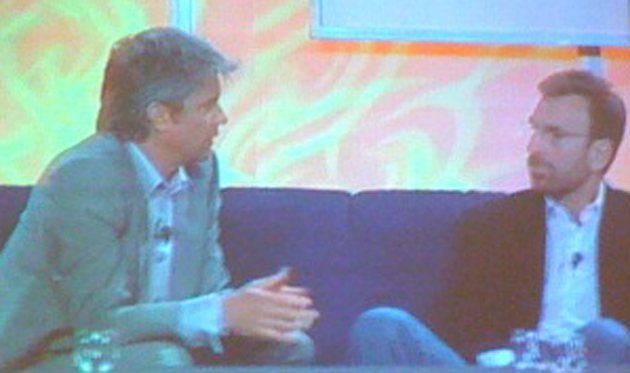
MySpace CEO Chris DeWolfe and Warner Music Group’s Edgar Bronfman take the stage with John Battelle at the Web 2.0 Summit this evening. The topic: The Future Of Music.
The time is ripe. MySpace has launched it’s new MySpace Music initiative; Facebook continues to explore its options.
Our live notes are below:
John Battelle starts things off by noting that MySpace Music continues to not have a CEO (they’ll announce it shortly). DeWolfe says they’ll make an announcement shortly – it isn’t coming this evening.
Bronfman on how Warner Music is different than the other labels: Says he came to Warner at the beginning of 2004, and it was clear that they had to innovate to grow, not litigate. Until MySpace Music came along, he says, there was no online ecosystem for music (MySpace Music sells songs, streams songs, sells ringtones and will eventually sell concert tickets and other merchandise).
He says there is no one channel that will replace CD revenues. It will take a whole series of business models, he says, adding that the music industry will look very different in five years. Even download revenue won’t be the most important revenue source.
DeWolfe on iTunes v. MySpace Music: says there has been a lot of friction between labels, artists and users. MySpace wanted to bring everyone together, he says. He talks about how great Napster was for the user, but the artist didn’t get paid. He wanted a service that paid the labels and artists, and gave users a great experience. Says now is the time – 20% of Warner’s revenues are from digital sales.
He says the biggest difference with MySpace Music is the community – that the MySpace community can help users choose what to consumer.
Bronfman on Apple: gives them credit, they pulled off a sexy device combined with a great service.
Bronfman on evolving from packaged goods model to multi-channel digital world: Says they’ve reorganized the company to move from a few large distributor customers and now have 500 or more customer agreements. They also have hundreds of SKUs every time they release a single, whereas they only had 3 per song before.
Distribution is a commodity, he says. The key is owning the master recordings and focusing on editorial and marketing.
DeWolfe on the month since launch: over 1 billion streams in first few days. Over 80 million playlists created. 5 million bands uploading music.
Battelle asks Bronfman how the industry got comfortable with DRM-free music. He says DRM is great in theory but doesn’t work in practice. They are facing reality and adapting to a “very different world than any content industry has ever faced.” Says they are guinea pigs but they are finding their way through it.
DeWolfe says MySpace likely won’t create a device, but will focus on backing original music, live events, etc.
DeWolfe says MySpace Music isn’t competitive with iTunes; rather that MySpace Music will help Apple sell more iPods.
Bronfman says MySpace Music is great way to filter and develop talent. It’s expensive to develop talent, he says, to bring them to their full potential. Says that it takes much more effort to break an artist than it ever did before because people’s attention is so split.
Bronfman on Radiohead’s experiments with their new album this year: he was disappointed that so many users chose to take it for free. Battelle suggests many of the downloads were sampling. Bronfman says it’s important to work with an artist over their career to sometimes give music away to sell tickets, sometimes sell music to promote events, etc.
Bronfman says that every new artist they sign they take rights in every revenue stream. Calls these 360 rights, and that over 1/3 of their artists are under these contracts. He says that they can’t make the investment they need to make unless they have these rights, and their incentives won’t be aligned.
Discussion of Facebook. Battelle says that Facebook overtook MySpace in U.S. traffic this year – DeWolfe corrects him and says MySpace is still much larger than Facebook. He also says 70% of Facebook users are on MySpace too. Says he isn’t worried about Facebook music, they have no artists and there are massive barriers to entry. MySpace has passionate music lovers and a deep sales team.